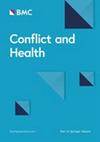脆弱和受冲突影响环境中卫生系统的复原力:系统性范围界定审查
IF 3.1
2区 医学
Q2 PUBLIC, ENVIRONMENTAL & OCCUPATIONAL HEALTH
引用次数: 0
摘要
卫生系统复原力(HSR)研究是一个迅速发展的领域,其中的关键概念和理论框架不断涌现,争论激烈。脆弱和受冲突影响的环境(FCAS)面临着多重压力,而复原力是这些环境的一个重要特征。然而,在这种环境下产生的证据却很有限。我们进行了一次范围审查,以(a) 确定在分析家庭、社区和社会医疗服务环境中的冲击和压力因素时所使用的卫生系统复原力概念框架;(b) 描述在这些环境中参与医疗治理和服务提供的不同参与者的代表性;以及 (c) 确定与家庭、社区和社会医疗服务环境中的吸收、适应和转变相关的卫生系统运作。我们采用了标准、广泛的搜索方法。搜索范围包括 2006 年至 2022 年 1 月间发表的研究。我们收录了所有采用卫生系统研究视角分析危机卫生响应的同行评审文献和灰色文献。我们采用归纳和演绎两种方法进行了专题分析,并采用了与 Kruk 等人确定的复原力特征和 Blanchet 等人描述的复原力能力相关的框架。以治理为中心、以能力为导向的 HSR 框架成为最常用的分析视角,具体用于描述针对冲突和长期暴力的卫生对策。大多数研究侧重于公共卫生系统的抗灾能力分析,而对私营卫生部门的研究仅作为公共卫生系统抗灾能力分析的补充。尽管社区在支持 HSR 方面的作用已得到广泛承认,但其代表性却微乎其微。在《家庭、社区和儿童健康标准》中,对实施 HSR 的行动的记录主要集中在吸收和适应方面,而对转变则很少描述。吸收性、适应性和变革性干预措施在以下七个不同领域得到了描述:安全与安保、社会、医疗系统治理、库存与供应、建筑环境、医疗保健劳动力以及医疗保健服务。我们的研究结果表明,以治理为中心的框架有助于更好地理解 FCAS 中的 HSR。未来的医疗卫生服务改革研究应记录推进医疗卫生服务改革的适应性和变革性战略,特别是与旨在促进医疗卫生系统安全和安保、医疗卫生建筑环境以及采用社会公正视角的行动有关的战略。本文章由计算机程序翻译,如有差异,请以英文原文为准。
Health systems resilience in fragile and conflict-affected settings: a systematic scoping review
Health systems resilience (HSR) research is a rapidly expanding field, in which key concepts are discussed and theoretical frameworks are emerging with vibrant debate. Fragile and conflict-affected settings (FCAS) are contexts exposed to compounding stressors, for which resilience is an important characteristic. However, only limited evidence has been generated in such settings. We conducted a scoping review to: (a) identify the conceptual frameworks of HSR used in the analysis of shocks and stressors in FCAS; (b) describe the representation of different actors involved in health care governance and service provision in these settings; and (c) identify health systems operations as they relate to absorption, adaptation, and transformation in FCAS. We used standard, extensive search methods. The search captured studies published between 2006 and January 2022. We included all peer reviewed and grey literature that adopted a HSR lens in the analysis of health responses to crises. Thematic analysis using both inductive and deductive approaches was conducted, adopting frameworks related to resilience characteristics identified by Kruk et al., and the resilience capacities described by Blanchet et al. Thirty-seven studies met our inclusion criteria. The governance-centred, capacity-oriented framework for HSR emerged as the most frequently used lens of analysis to describe the health responses to conflict and chronic violence specifically. Most studies focused on public health systems’ resilience analysis, while the private health sector is only examined in complementarity with the former. Communities are minimally represented, despite their widely acknowledged role in supporting HSR. The documentation of operations enacting HSR in FCAS is focused on absorption and adaptation, while transformation is seldom described. Absorptive, adaptive, and transformative interventions are described across seven different domains: safety and security, society, health system governance, stocks and supplies, built environment, health care workforce, and health care services. Our review findings suggest that the governance-centred framework can be useful to better understand HSR in FCAS. Future HSR research should document adaptive and transformative strategies that advance HSR, particularly in relation to actions intended to promote the safety and security of health systems, the built environment for health, and the adoption of a social justice lens.
求助全文
通过发布文献求助,成功后即可免费获取论文全文。
去求助
来源期刊

Conflict and Health
Medicine-Public Health, Environmental and Occupational Health
CiteScore
6.10
自引率
5.60%
发文量
57
审稿时长
18 weeks
期刊介绍:
Conflict and Health is a highly-accessed, open access journal providing a global platform to disseminate insightful and impactful studies documenting the public health impacts and responses related to armed conflict, humanitarian crises, and forced migration.
 求助内容:
求助内容: 应助结果提醒方式:
应助结果提醒方式:


